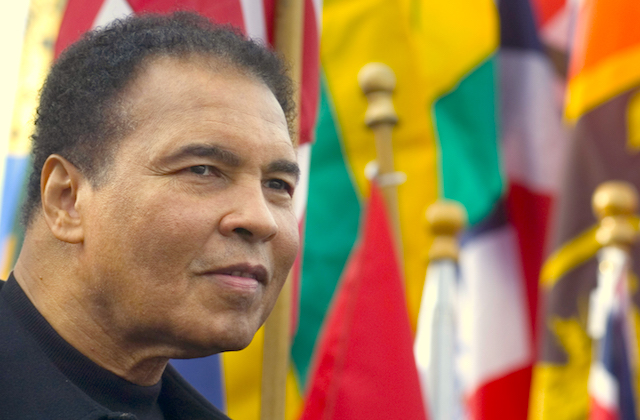Haki R. Madhubuti, the poet, educator, Third World Press founder and Black Arts Movement builder, wasn’t "running buddies" with Muhammad Ali. Yet, he considered him a role model and brother-in-struggle. Here, a new poem and a touching tribute to the Greatest of All Time.
Shook Up the World*
Ali shuffled and
rope-a-doped in the ring of life
all while dancing to the progressive
tunes that placed Black people in the
center of a new world conversation,
luminous in thoughts and ideas,
Black against Empire and lies.
he was our butterfly, bee and hawk,
principled actor on an international stage that
gave us voice, nerve and spiritual depth,
he shook up the world.
We are of the same generation and questions. I, Don L. Lee, was born on the day that also birthed W.E.B. DuBois and a month or so after, Cassius Marcellus Clay Jr. in the year of 1942. We were to become Muhammad Ali and Haki Madhubuti. Ali was born to transform the world; I to write poetry and learn from him. On Ali’s earth-day there was lightning, thunderstorms and rainbows that would be a testament to his grand, boisterous, transcendent and finally silent life.
We were born in the decade of war-talk and actions, horrific murder, nuclear catastrophe, world migrations and White supremacy; among and of an enslaved and deprived people beginning to re-name ourselves, re-write our stories and walk together in a land that was built on our backs that displayed pure hatred toward us and our shadows.
In our lifetime, we did liberating work, and met twice. We never became friends or running buddies, yet we were brothers. Our world gave us the clear consciousness and promises of W.E. B. DuBois, Mary McCloud Bethune, Kwame Nkrumah, Ella Baker, Gwendolyn Brooks, Nelson Mandela and the unknown millions laboring during the many, many winters of our multiple comings.
If greatness needs a name, it is Ali. Although "The Louisville Lip" was at first a self-proclaimed call to his significance, it soon became an unshakeable international consensus—secured from his 1960 Olympic light heavyweight gold in Rome to his first World Heavyweight Championship (there would be three) against Liston in 1969, in Miami Beach.
From his transformation from Clay to X to Muhammad Ali under the careful eyes of the Honorable Elijah Muhammad and Malcolm X of The Nation of Islam, to the non-forward step to be drafted in an Asian war not of our making, he would go on to state, “I ain’t got nothing against the Viet Cong” and “they never called me nigger, they never lynched me, they didn’t put no dogs on me.” Bravery had a new hero, Muhammad Ali.
This act of selflessness and courage brought instant domestic hate from Whites and some Blacks. The U.S. government fined him $10,000 and stripped him of his championship belt and proceeded to prosecute him nationally. In their eyes he had become public enemy number one, costing him millions of dollars in legal fees and earnings.
Domestically hated by many but globally beloved within Pan-Africanist, Black Nationalist, Civil Rights, Black Power, Black Arts and progressive circles, he was our unambiguous voice for that which was good, just, right, spiritual and politically correct.
For three years he earned a living by speaking the truth at hundreds of colleges and universities, community centers, and Black churches. He had been whiteballed like Langston Hughes, Ossie Davis, Ruby Dee, Malcolm X and others who dared to contradict the nation’s lies about Black people and African and international affairs.
After the Supreme Court reversed his 1969 conviction for refusing induction into the Army, he had to go 12 rounds against Joe Frazier to eventually fight George Foreman in 1974 in the famous “Rumble in the Jungle” in Kinshasa, Zaire. He dropped Foreman in the eighth round using his rope-a-dope tactics, earning an unheard-of $5 million purse. He was now back on the boxing, political and cultural map of the world.
Muhammad Ali, larger than life, world class “poet” and conscientious-objector; inventor of the Ali Shuffle, conqueror of Liston, Frazier and Foreman. A Black man who went toe-to-toe with the U.S. government and won, who enlarged all of our hearts, helping us to erase the fear of being proactive about Black struggle, Black love and Black Africa. He embraced world Islam, became a loving example of it and us. His best poem was his shortest, it read, “Me! Wheeeeee!” His death brought tears to me and us, but they were tears of joy and celebration for a brother who never betrayed us.
Haki R. Madhubuti is a poet, founder and publisher of Third World Press and the former University Distinguished professor at Chicago State University. “Taking Bullets: Black Life in Twenty-First Century America” is his latest book.
*Post has been revised since publication to reflect the title of the poem, "Shook Up the World."
